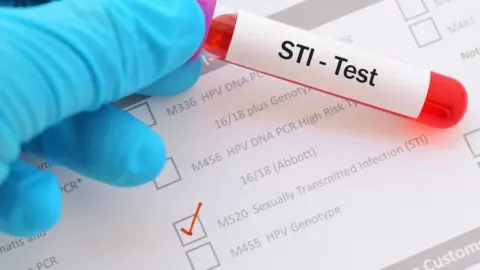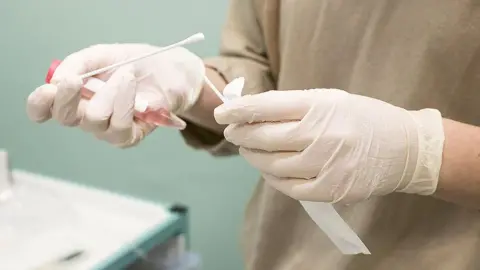STIs: 'Very few' online tests meet official standards
 Getty Images
Getty ImagesSexually transmitted infection tests being sold online are putting patients' health at risk, researchers are warning.
A new study has found that "very few" STI services are meeting official standards.
"People are spending a lot of money for poor quality," researcher Dr Emma Harding-Esch tells Radio 1 Newsbeat.
It's leading to calls for tighter controls on the market to make sure products are safe.
Ordering STI tests online has become increasingly popular during the pandemic.
The kits usually involve 'self-sampling' - where you take a specimen such as blood or urine, before posting it to a lab for testing, or 'self-testing' - where you conduct and interpret the result yourself.
Free tests in person and online are provided by the NHS but scientists at the London School of Hygiene and Tropical Medicine are concerned about people paying for private and more unreliable services instead.
Where the tests are from
Their research - published in the BMJ's Sexually Transmitted Infections journal - looked at more than 30 providers found through Google and Amazon searches in June 2020.
Of those, 26 were private and cost money, while five were free and commissioned by the NHS.
"Many of the providers - especially those that were for profit - didn't comply with the national guidelines," says Dr Harding-Esch.
 Getty Images
Getty ImagesWhile some problems were identified with the information provided by NHS-commissioned services, these tests were found to be "closest to the guidelines", which are set by the British Association for Sexual Health and HIV and Faculty of Sexual and Reproductive Healthcare.
A variety of issues were discovered with many of the paid services, including inappropriate infections being tested for, incorrect samples being used, and a lack of advice being offered after diagnosis.
'Personal consequences'
Dr Harding-Esch believes this is "absolutely" putting patients' health at risk.
"It can result in people being worried or treated when they don't need to be, or if a poor quality test has been used, it might not have picked up an infection, so STIs can be transmitted to partners," she says.
"It can have personal consequences, and also wider public health consequences."
More research is needed to understand why people might be choosing to pay for private tests and how popular they are.
But there are concerns the problems could be particularly affecting younger patients who are either unaware of the free and more reliable NHS services, or hesitant to use them because of "misinformation".
Why are patients buying tests?
"Through anecdotal feedback, I think some patients are concerned NHS providers will require you to use your real name and your data will be shared with your GP - and that's not the case.," Dr Harding-Esch explains.
"NHS providers are anonymous and confidential services."
"If you Google 'STI tests', the top hits are the private providers and that's what young people will then go for because it comes up first".
Google has declined to respond to Newsbeat's request for comment, while Amazon says it requires "all products offered in our store to comply with applicable laws and regulations".
Researchers do also highlight the benefits of tests being available online.
"It's a great move in the right direction," says Dr Harding-Esch, "because going to a walk-in clinic can have barriers: people might be embarrassed or they might not have the time."
"It's about having choice for patients."
But they are calling for changes to the way the online market is controlled.
"We're asking for regulatory change to ensure that all online providers are complying with national guidelines, and are held to account if they don't."
"We'd really like to engage with the MHRA [Medicines and Healthcare products Regulatory Agency] to see if it's something they can do," says Dr Harding-Esch.
Until then, she has this advice: "It's really important to get tested. Go to an NHS provider or speak with a qualified staff member at an NHS clinic."
An MHRA spokesperson told Newsbeat: "If a product is found to be non-compliant, the MHRA takes action to ensure regulatory compliance. What action is taken is determined by considering all the available evidence and relevant legal precedents.
"We are committed to ensuring that medicines and medical devices are safe for the UK public and meet the required standards."


